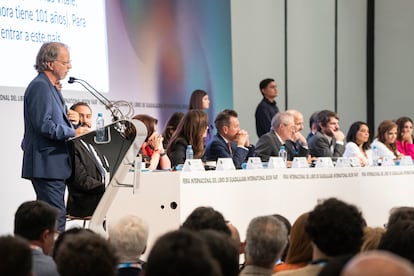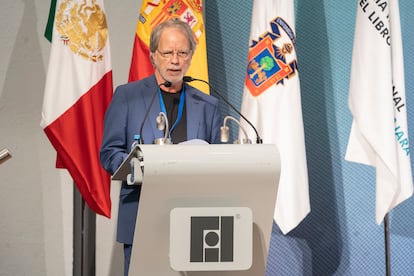This Saturday, Mozambican Mia Couto received the Romance Languages award given by the Guadalajara International Book Fair (FIL) with a tribute to poetry and in particular to Mexican poets and writers, from Octavio Paz to Juan Rulfo. The writer recalled that the first visa he needed to enter Mexico for the first time in 2018 also opened the door to a literary world that is part of his passions. “A part of me told me that I had already been here. A part of me was born in this place. Like many of my generation, I am originally from that Mexico that came to me through its books, its songs and its painting,” Couto stated in a beautiful and short speech through which he took a journey through Mexican literature, but that It was also a vindication of Portuguese-language writers, that is, “African writers who live a double segregation: their geography and the language in which they write.”
Couto began his speech by remembering his childhood, when at the age of nine his father took him to visit a natural park in central Mozambique. That park, he said, is crossed by a tectonic fault that “tears the African continent from top to bottom.” In that greatness, he added, “I saw the world born.” His father put his hand on his shoulder and he asked, “Do you like it?” “I wanted to respond,” said the writer, “but I had no words. I was missing a language. Then he murmured, “My son, this is your church.” For the writer, that announcement marked his destiny. “If that moment was a church, poetry would become my religion,” he stated. Couto has recalled that it was his father who introduced him to the poetry of Octavio Paz, which immediately dazzled him. He then cited some verses from the Mexican, who affirms that I am a man: I don’t last long and the night is enormous. / But I look up: the stars write. / Without understanding I understand: I am also writing / and at this very moment someone is spelling me.
“What Octavio Paz saw in the spelling of the stars and what I look for in writing: someone who listens to me and who exchanges his soul with me. And do it with such delicacy that I become this other creature that spells me. That is the job of poetry: to give us the word that makes us born,” the writer stated. For Couto, the journey between books and poetry has been the visa that has allowed him to find a way to express himself, to tell what shakes his being, a way to, he said, quoting Carlos Fuentes, “save the word.” And he has mentioned some books that helped him in that endeavor: The book of restlessnessby Fernando Pessoa; The palm wine drinker, by Amos Tutuola; he Great Sertón: Paths, by Guimarães Rosa and, finally, Pedro Paramo, by Juan Rulfo. “All those books clarified my purpose: what I was looking for was not exactly a story. I was looking for a language. What I was looking for was the language that has existed since before we were people, what I was looking for was the word eternally suspended between the abyss and the path,” he explained.
Saving the words, which is the same as saving literature in the middle of a stormy world, where lies prevail, politicians full of lies, hatred that festers on social networks, disagreements, war. “In our days, the so-called reality became so empty and, at the same time, so insolent and so arrogant. Our daily lives have become so brutal and impoverished that, to become human, we need more than ever to see those other sides of reality. Because that staging of reality that reaches us through a luminous screen is not just an image. It’s a wall. A wall that does not let us see our own humanity,” he said.
Born in 1955 in the port of Beira, on the central coast of Mozambique, Couto has become one of the most prominent authors of the Portuguese language and his work has been translated into more than 30 languages. The roots of his work are found in journalism, a profession with which he began at a very young age to portray the violence that was eating away at his country, which suffered a bloody civil war that began at the end of the seventies of the last century and that left a million dead. The profession of reporting, the author has explained, has been very important in his learning as a writer and he has defined it as a “great school of human knowledge”, which has given him the possibility of being close to the people of his country and knowing first-hand their sufferings.
“I come from a country where rivers and stones speak with people, animals and trees share silences with the gods. I am not folklorizing what is, above all, ancient wisdom. In these cosmogonies there are no borders between the living and the non-living, there are no borders in dreams and the gods that live inside and outside our body. We are human because we are all others. All my work seeks only to translate that ontological mobility that still inhabits the various Mozambican cultures today. This existential wandering allows us to travel between identities that today appear to us as threatened territories, defended by sacred walls. “This visit of worlds is absolutely vital in a time governed by fear, hatred, the right to violence and the legitimization of revenge,” said the writer.

Couto wanted to recognize with the award given to him by the FIL, one of the most important literary awards in literature, his fellow African and Portuguese writers. “I must say that I am not here alone. I want to share this award with all the writers in my country. It is they who, for decades, have been fighting for Mozambique to gain the visibility it deserves. Mozambican writers, all of them, reaffirm their plural identity against the inheritance of stereotypes that weigh on Africa and Africans,” he explained. “African writers of the Portuguese language experience a double segregation: their geography and the language in which they write. I thank the jury for having contributed so that the voices of these writers can be known beyond their borders,” he added.
The FIL award ceremony, a fair whose guest of honor this year is Spain, has also served to remember the ties that unite the countries of three continents starting from the Romance languages, from America to Europe, landing in Africa . But also to highlight the cultural relationship that unites two specific countries: Mexico and Spain. The Spanish Minister of Culture, Ernest Urtasun, spoke about this relationship, taking advantage of his speech to remember Mexican solidarity with the Spanish exile. “What exile entailed is a lesson in fraternity that we Spaniards will never forget,” said Urtasun, followed by stunning applause. “Many came with a small suitcase, their knowledge, the power of poetry, wanting to contribute with their work. We only have words of gratitude. The recognition of exile is to recognize memory and the memory of exile is the space to continue building solidarity between both countries,” he added at a time when diplomatic relations between both nations remain tense. Urtasun inaugurated the Spanish pavilion at the fair minutes later, together with the Nicaraguan writer Sergio Ramírez, curator of the cultural program that Spain presents this year, the director of the FIL, Marisol Schulz, the Mexican politician Cuauhtemoc Cárdenas and the Spanish poet Mario Obrero.
It is a meeting, that of the FIL, which in Couto’s words allows us to recover “our humanity” through literature. For him, this fair, the most important in the Spanish language, “is, without a doubt, a place to share what, in each of us, is the entire humanity. “I am here, at this literary festival and I remember my father’s words: this place, this fair, became one of my churches.” A temple in which the entry visa is books.

